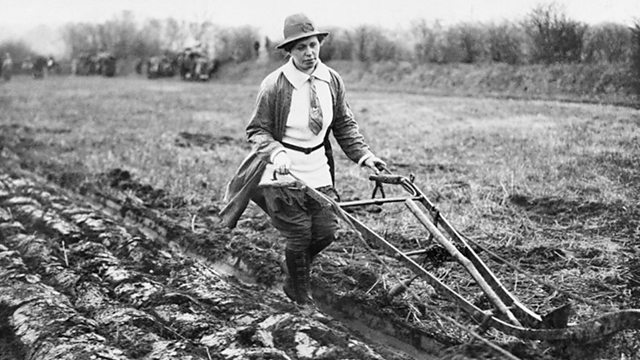Truro, Cornwall: Women’s Land Army
When women were replacing men in farms
The inexperienced units of the Women’s Land Army were created in 1915 increasing in numbers during 1916 and 1917. Hundreds of them worked in Cornish fields replacing the men who were serving in the conflict. They were nicknamed ‘Land Girls’ and despite the obvious solution to an increasing problem of dwindling man power, bringing women onto farms was not always a popular move.
The Board of Trade sent ‘agricultural organisers’ to speak with farmers to encourage them to accept women.
One of the women that trained near Truro was Vera Raymond who gave an interview to the Imperial War Museum about her time on the farm. Vera found one aspect of her duties on a farm in Cornwall too much to cope with:
“I went on a farm just outside of Truro. We did all sorts out there, the haymaking and everything to do with the farm, horses and everything. But each one of us had to clean out these pig’s houses, you see, you had to take it in turn. And the farmer said to me ‘well it’s your turn today’, so I went to do it and of course I fainted…the smell! I never did it after, either; I never had to clean pigs out again. But we did thrashing and everything that was needed on the farm, everything – except for that I didn’t do again.” (Vera Raymond, IWM interview)
But a woman with more staying power was Elizabeth Nora Burnett, a professional classical musician who proved her might in farming at Higher Lanner Farm on the River Fal. Her granddaughter Jean Nunn discovered a citation dated April 1917, recognising Elizabeth’s efforts:
“Every woman who helps in agriculture during the war is as truly serving her country as the man who is fighting in the trenches or on the sea.”
As women replaced men on the farms, for many farmers who had left to fight, being separated from the land they loved proved difficult. Joseph Paynter was farming at Hele Barton at Week St Mary before leaving for France. Joseph would send frequent enquiries about the farm. This extract is from a letter dated 1916:
“There has not been frost out here so much as you had at home. I thought the West country was noted for being a wet climate but I think Northern France is a good deal worse. What it is like in the Somme now I do not know, it must be a good deal worse than when I left.”
Joseph’s mind was never far from the farm and home.
“The Hay in Paynter’s field was worth cutting wasn’t it? I wonder what the new Government is intending to do about growing more produce and how they will manage the labour problems.” (Joseph Paynter, December 1916)
Location: Tregavethan, Truro, Cornwall TR4 9EB
Image: Land girl ploughing a field, courtesy of IWM
Duration:
This clip is from
Featured in...
![]()
�鶹�� Radio Cornwall—World War One At Home
Places in Cornwall that tell a story of World War One
![]()
Home Front Life—World War One At Home
Everyday life in the towns, villages and countryside
![]()
Women—World War One At Home
How war transformed the status and role of women
More clips from World War One At Home
-
![]()
The loss of HMY Iolaire
Duration: 18:52
-
![]()
Scotland, Slamannan and the Argylls
Duration: 07:55
-
![]()
Scotland Museum of Edinburgh mourning dress
Duration: 06:17
-
![]()
Scotland Montrose 'GI Brides'
Duration: 06:41







